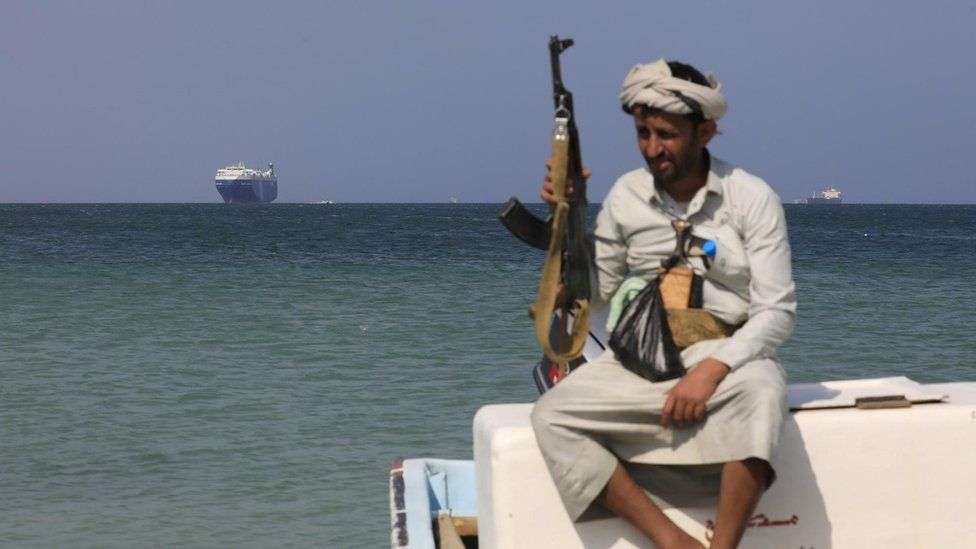The US, UK and ten other states have warned rebels in Yemen they will face consequences if they continue to attack commercial shipping in the Red Sea.
In a joint statement, the group of mainly Western countries called for an immediate end to the attacks.
However the Houthis have responded with defiance, vowing to continue targeting vessels they consider linked to Israel.
The situation in the strategically vital southern Red Sea is now at a stand-off.
The Bab al-Mandab strait is a critical waterway through which almost 15% of global trade passes. If attacks continue, the fear is that fuel prices will rise and supply chains will be damaged.
Iranian-backed Houthi rebels have declared support for Hamas in the war it launched against Israel in October. Since November, the rebels have attacked commercial shipping in the Red Sea more than 20 times using missiles, drones, fast boats and helicopters. They have claimed - often falsely - the ships were linked to Israel.
US and British warships in the region have intercepted some missiles but they have resisted attacking targets in Yemen itself. That may be about to change.
In their statement, the group of 12 states - Australia, Bahrain, Belgium, Canada, Denmark, Germany, Italy, Japan, Netherlands, New Zealand, the UK and the US - called the attacks on shipping "illegal, unacceptable, and profoundly destabilising" and said there was "no lawful justification for intentionally targeting civilian shipping and naval vessels".
Any armed response is likely to mean armed action against Houthi bases, boats and weapons.
US, British and French warships in the Red Sea all have the capability to shoot down Houthi missiles and drones but it is getting expensive and they can't be sure to hit every single one, especially if the Houthis decide to launch a "swarm" attack - launching multiple drones and missiles at once, as Russia has been doing in Ukraine.
Yemen may be the poorest Arab nation but the Houthis have a large stockpile of missiles and drones.
The International Chamber of Shipping says 20% of the world's container ships are avoiding the Red Sea and steaming around southern Africa instead.
In a debate at the UN Security Council on Wednesday evening, there was unanimous condemnation of the Houthi attacks but there were also warnings against further escalation.
The US ambassador to the UN for management and reform, Chris Lu, said the attacks posed "grave implications for maritime security, international shipping and commerce". Iran's role, he added, was "the root of the problem". "Iran has long enabled these attacks by the Houthis," he said.
Iran has denied supporting the strikes. Despite this, it is unclear how it may respond if Western air strikes are launched against its Yemeni allies.
The group comes from a sub-sect of the country's Shia Muslim minority, the Zaidis. They take their name from the movement's founder, Hussein al Houthi.
They have been fighting a civil war since 2014 against Yemen's government and control both the capital Sana'a and the north of the country, as well as the Red Sea coastline.
The government has been backed against the Houthis by a coalition of Arab countries led by Saudi Arabia and the UAE.








